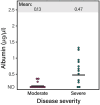Lung mucosal immunity to NTHi vaccine antigens: Antibodies in sputum of chronic obstructive pulmonary disease patients
- PMID: 38655676
- PMCID: PMC11057560
- DOI: 10.1080/21645515.2024.2343544
Lung mucosal immunity to NTHi vaccine antigens: Antibodies in sputum of chronic obstructive pulmonary disease patients
Abstract
Chronic obstructive pulmonary disease (COPD) is a common chronic respiratory illness in older adults. A major cause of COPD-related morbidity and mortality is acute exacerbation of COPD (AECOPD). Bacteria in the lungs play a role in exacerbation development, and the most common pathogen is non-typeable Haemophilus influenzae (NTHi). A vaccine to prevent AECOPD containing NTHi surface antigens was tested in a clinical trial. This study measured IgG and IgA against NTHi vaccine antigens in sputum. Sputum samples from 40 COPD patients vaccinated with the NTHi vaccine were collected at baseline and 30 days after the second dose. IgG and IgA antibodies against the target antigens and albumin were analyzed in the sputum. We compared antibody signals before and after vaccination, analyzed correlation with disease severity and between sputum and serum samples, and assessed transudation. Antigen-specific IgG were absent before vaccination and present with high titers after vaccination. Antigen-specific IgA before and after vaccination were low but significantly different for two antigens. IgG correlated between sputum and serum, and between sputum and disease severity. Sputum albumin was higher in patients with severe COPD than in those with moderate COPD, suggesting changes in transudation played a role. We demonstrated that immunization with the NTHi vaccine induces antigen-specific antibodies in sputum. The correlation between IgG from sputum and serum and the presence of albumin in the sputum of severe COPD patients suggested transudation of antibodies from the serum to the lungs, although local IgG production could not be excluded.Clinical Trial Registration: NCT02075541.
Keywords: COPD exacerbations; COPD pathology; bacterial infection; infection control; respiratory infection.
Plain language summary
What is the context? Chronic obstructive pulmonary disease (COPD) is the most common chronic respiratory illness in older adults and the third leading cause of death worldwide.One bacterium in the lungs, non-typeable Haemophilus influenzae (NTHi), is responsible for acute exacerbation of the disease, characterized by an increase in airway wall inflammation and symptoms, leading to high morbidity and mortality.A vaccine targeting NTHi was previously developed but did not show efficacy in reducing exacerbations in COPD patients, probably because the vaccine did not elicit an immune response in the lung mucosae, where the bacteria are located.What is the impact? Parenteral immunization with new vaccines targeting NTHi is able to elicit immune defense at the level of lung mucosae.Now that antibodies can be measured in sputum, new vaccines against COPD exacerbations or other lung infections can be tested for efficacy in the actual target tissue.Also, lung immunity against specific pathogens can now be tested.What is new? We determined that antigen-specific antibodies were present in the lungs after vaccination; these were assessed in sputum after vaccination with NTHi surface antigens.NTHi-specific IgG were present in the lungs and appeared to have arrived there primarily by transudation, a type of leakage from the serum to the lung mucosae.Transudation appeared to be stronger in severe than in moderate COPD patients.
Conflict of interest statement
AKA, CB, DS, FB, LM, MB, MCo, OF, SA, SL, SR, and SRP are employed by GSK. AKA, LM, MB, MCo, SR, and SRP hold shares in GSK. The authors declare no other financial and non-financial relationships and activities. MCa declare no financial and non-financial relationships and activities and no conflicts of interest.
Figures





Similar articles
-
Relationships between Mucosal Antibodies, Non-Typeable Haemophilus influenzae (NTHi) Infection and Airway Inflammation in COPD.PLoS One. 2016 Nov 29;11(11):e0167250. doi: 10.1371/journal.pone.0167250. eCollection 2016. PLoS One. 2016. PMID: 27898728 Free PMC article.
-
Non-typeable Haemophilus influenzae-Moraxella catarrhalis vaccine for the prevention of exacerbations in chronic obstructive pulmonary disease: a multicentre, randomised, placebo-controlled, observer-blinded, proof-of-concept, phase 2b trial.Lancet Respir Med. 2022 May;10(5):435-446. doi: 10.1016/S2213-2600(21)00502-6. Epub 2022 Jan 10. Lancet Respir Med. 2022. PMID: 35026180 Clinical Trial.
-
The Interplay Between Immune Response and Bacterial Infection in COPD: Focus Upon Non-typeable Haemophilus influenzae.Front Immunol. 2018 Nov 5;9:2530. doi: 10.3389/fimmu.2018.02530. eCollection 2018. Front Immunol. 2018. PMID: 30455693 Free PMC article. Review.
-
Non-typeable Haemophilus influenzae protein vaccine in adults with COPD: A phase 2 clinical trial.Vaccine. 2019 Sep 24;37(41):6102-6111. doi: 10.1016/j.vaccine.2019.07.100. Epub 2019 Aug 22. Vaccine. 2019. PMID: 31447126 Clinical Trial.
-
Nontypeable Haemophilus influenzae and chronic obstructive pulmonary disease: a review for clinicians.Crit Rev Microbiol. 2018 Mar;44(2):125-142. doi: 10.1080/1040841X.2017.1329274. Epub 2017 May 25. Crit Rev Microbiol. 2018. PMID: 28539074 Review.
Cited by
-
Inflammatory Responses to Non-Typeable Haemophilus influenzae Clinical Isolates from Invasive and Non-Invasive Infections.Pathogens. 2025 Feb 21;14(3):210. doi: 10.3390/pathogens14030210. Pathogens. 2025. PMID: 40137696 Free PMC article.
References
-
- World Health Organization . The top 10 causes of death; [accessed 2023 Feb 13] https://www.who.int/news-room/fact-sheets/detail/the-top-10-causes-of-death.
-
- MacNee W. ABC of chronic obstructive pulmonary disease. Pathology, pathogenesis, and pathophysiology. BMJ. 2006;332(7551):1202–9. doi:10.1136/bmj.332.7551.1202. - DOI
-
- European Respiratory Society . European Lung White Book. Respiratory Health and Disease in Europe. Sheffield, UK: European Respiratory Society; 2013.
Publication types
MeSH terms
Substances
Associated data
LinkOut - more resources
Full Text Sources
Other Literature Sources
Medical
Miscellaneous
